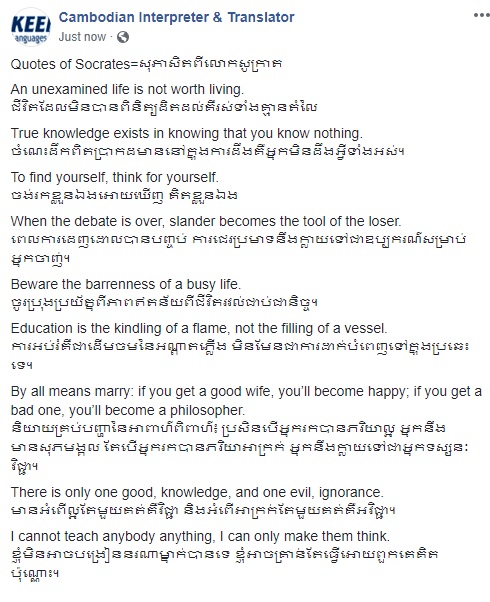Sunday, April 28th, 2019
now browsing by day
Did Socrates corrupt the mindset of Athens youths?

Quotes of Socrates=សុភាសិតពីលោកសូក្រាត
An unexamined life is not worth living.
ជីវិតដែលមិនបានពិនិត្យដិតដល់គឺរស់ទាំងគ្មានតំលៃ
True knowledge exists in knowing that you know nothing.
ចំណេះដឹកពិតប្រាកដមាននៅក្នុងការដឹងគឺអ្នកមិនដឹងអ្វីទាំងអស់។
To find yourself, think for yourself.
ចង់រកខ្លួនឯងអោយឃើញ គិតខ្លួនឯង
When the debate is over, slander becomes the tool of the loser.
ពេលការដេញដោលបានបញ្ចប់ ការជេរប្រមាទនឹងក្លាយទៅជាឧប្បករណ៌សម្រាប់អ្នកចាញ់។
Beware the barrenness of a busy life.
ចូរប្រុងប្រយ័ត្នពីភាពឥតន័យពីជីវិតរវល់ជាប់ជានិច្ច។
Education is the kindling of a flame, not the filling of a vessel.
ការអប់រំគឺជាដើមចមនៃអណ្តាតភ្លើង មិនមែនជាការដាក់បំពេញទៅក្នុងប្រឆេះទេ។
By all means marry: if you get a good wife, you’ll become happy; if you get a bad one, you’ll become a philosopher.
និយាយគ្រប់បញ្ហានៃអាពាហ៌ពិពាហ៌៖ ប្រសិនបើអ្នករកបានភរិយាល្អ អ្នកនឹងមានសុភមង្គល តែបើអ្នករកបានភរិយាអាក្រក់ អ្នកនឹងក្លាយទៅជាអ្នកទស្សនៈវិជ្ជា។
There is only one good, knowledge, and one evil, ignorance.
មានអំពើល្អតែមួយគត់គឺវិជ្ជា និងអំពើអាក្រក់តែមួយគត់គឺអវិជ្ជា។
I cannot teach anybody anything, I can only make them think.
ខ្ញុំមិនអាចបង្រៀននរណាម្នាក់បានទេ ខ្ញុំអាចគ្រាន់តែធ្វើអោយពួកគេគិតប៉ុណ្ណោះ។
តាមពិតសិស្សរបស់សូក្រាតគឺប្លាតូបានបកស្រាយយ៉ាងច្បាស់អំពីការចោទប្រកាន់នោះ ហើយការចោទប្រកាន់ដែលពោរពេញទៅដោយលោភៈដូចជាពួកSophistsក្រុមអ្នកនយោបាយពុករលួយច្រណែន ដោយទោសៈគឺការខឹងទៅលើពាក្យសូមទោសApologyរបស់សូក្រាតនៅចំពោះមុខតុលាការ ដែលប្រការនេះមិនមែនជាការទទួលកំហុសថាពង្វក់យុវជនអោយប្រព្រឹត្តអំពើពុករលួយទេតែជាការការពារខ្លួនself-defenceប៉ុណ្ណោះ និងមោហៈគឺការវង្វេងពីការពិតរបស់តុលាការជាពិសេសគណៈវិនិច្ឆ័យJuryដែលត្រវបានគ្របដណ្តប់ដោយអវិជ្ជាគឺជំនឿលើអាទិទេពក្រិចសម័យនោះយូរយារមកណាស់មកហើយ ផ្ទុយពីសូក្រាតដែលរមែងប្រកាន់ខ្ជាប់លើសច្ចធម៍Truthប៉ុណ្ណោះ។
Posted in Culture, Economics, Education, Leadership, Politics, Social | Comments Off on Did Socrates corrupt the mindset of Athens youths?
Tags: Aristotle, Plato, political philosophy, Socrates
From Hobbes to Hun Sen
ជាសង្ខេប អត្ថបទដោយលោកដេវីដ ហាត់ចង់បង្ហាញពីវប្បធម៌នយោបាយរបស់លោកហ៊ុន-សែនដែលយកអំពើហឹង្សាជាយានឈានទៅរកការគ្រប់គ្រង់ទោះក្នុងរូបភាពណាក៏ដោយ។ ការប្រៀបធៀបថាកម្ពុជាសព្វថ្ងៃជាសមិទ្ធិផលខុសឆ្ងាយពីរបបខ្មែរក្រហមហើយខ្លួននឹងខិតខំគ្រប់រូបភាពដើម្បីការពារសន្តិភាពគឺជាសក្ខីកម្មខាងការគំរាមគំហែងថាមានតែខ្លួនទេដែលអាចរក្សាសន្តិភាពដូចគ្នានឹងអ្វីដែលមេដឹកនាំខ្មែរក្រហមធ្លាប់អៈអាងដូច្នេះដែរ។ ក្នុងទស្សនៈរដ្ឋធម្មជាតិ(state of nature)របស់ហប់ ទស្សនៈវិទូនយោបាយក្រិចបុរាណ ទំលាប់នៃអំពើហឹង្សា(violence)គឺជាគន្លឹះសំខាន់នៃរដ្ឋអជ្ញាបុរាណ។ រដ្ឋធម្មជាតិនេះគ្មានទេយុត្តិធម៌ សេរីភាព និងកម្មសិទ្ធិឯកជន។ ផ្ទុយទៅវិញឡក់(Locke)ផ្តល់អត្ថន័យរដ្ឋធម្មជាតិខុសពីហប់(Hobbes) ត្រង់ថារដ្ឋធម្មជាតិជាបណ្តុំនាំអោយមានការប្រកួតប្រជែងតាមសេរីភាពនិងកំរិតសមត្ថភាពរបស់មនុស្សម្នាក់ៗដើម្បីឈរអោយបានខ្ពស់ដាច់គេ។ ការប្រកួតប្រជែងនេះហើយ ដែលធ្វើអោយរដ្ឋធម្មជាតិឈានទៅជារដ្ឋប្រជាជាតិទំនើប(modern nation-state)បច្ចុប្បន្នដោយម្នាក់ៗខ្លាចការបង្ហូរឈាមបើនៅតែសាចដាក់គ្នាដោយការឈានមករកកិច្ចព្រមព្រៀងបង្កើតជាច្បាប់ឡើយ…តែការយកច្បាប់ជាឈ្នាន់និងជាន់ឈ្លីតាមអំណាចលោភៈរបស់មនុស្សមានអំណាចម្នាក់នឹងនាំទៅរករដ្ឋធម្មជាតិ(state of nature)វិញដូចគ្នា។
From Hobbes to Hun Sen

Op-Ed: Asia Times
By DAVID HUTT
History doesn’t repeat itself, despite the thoughts of a certain German philosopher, and it certainly doesn’t manifest a dyad of tragedy and farce. If there is one iron law of history, it is of unintended consequences. Yet the ruling Cambodian People’s Party (CPP) assumes the first and neglects the latter.
For decades, the CPP, which came to power in 1979 after helping to overthrow the Khmer Rouge regime, has delighted in telling its citizens that Cambodia will fall back into the murderous, anarchic ways of the 1970s if the ruling party is ever removed from office. Just this week, Minister of Interior Sar Kheng warned that if the CPP were toppled from power, Cambodia would “fall into mud” like in the 1970s.
Prime Minister Hun Sen is often more explicit. “You must know that as long as I am the prime minister, I will not let them kill me. At any cost, I must protect peace and lives of Cambodian people,” he said on one occasion. On another, this January, he said that his government had “ended completely the chronic civil war” and brought “full peace” to Cambodia. “Cambodia, which used to be full of killing fields and dominated by the dictatorship regime and horrific genocidal regime, now becomes a land of freedom,” he said.
This narrative is well known among ordinary Cambodians, journalists and analysts, but it is worth reviewing every now and then, for it reveals a certain psychology of the ruling party. In the CPP’s framing of events, history certainly does appear to be repeating itself.
Rise of Khmer Rouge
In 1970, military commander Lon Nol seized power in a coup, supported though not necessarily materially backed by the US. But his brief republic was plagued by corruption and mismanagement, and five years later the Khmer Rouge violently took power, instigating a four-year tyrannous regime. Fast-forward to late 2017 and the CPP claimed that its main political opponent, the Cambodia National Rescue Party (CNRP), was also plotting a coup, and also with US backing – claims that have never been supported by a shred of evidence. The Supreme Court forcibly dissolved the CNRP in November 2017.
The CPP clearly wants to demonstrate that if it were ever ousted, it would be a repeat of Lon Nol’s coup of 1970 – the implication being that whoever removes the CPP from office would unleash the same disorder that allowed the Khmer Rouge to come to power, and then decades of civil war. Yet the CPP’s analogy of a repetitional history is sloppy. Today, there is no band of Maoist radicals waiting in the forests to seize power and unleash class warfare; there is no major geopolitical flagellation taking place in neighboring Vietnam and Laos; and Cambodians have known peace for decades now (remember Norodom Sihanouk’s regime only ruled for 17 years between independence in 1953 and Lon Nol’s coup in 1970).
Historical analogies are attractive for their simplicity and ease of understanding, but all too often they are widely off the mark. Yet they are revealing about the thoughts of the interlocutor.
Read between the lines and what the CPP is saying is that all that separates Cambodians from slipping back into the tyrannous brutality of the 1970s is the calming hand of the CPP
Pay attention to the latent meaning of the CPP’s warnings. What it basically assumes is that Cambodian society, at its heart, is brutish and violent and anarchic – bellum omnium contra omnes. Indeed, read between the lines and what the CPP is saying is that all that separates Cambodians from slipping back into the tyrannous brutality of the 1970s is the calming hand of the CPP – the Leviathan on the Mekong. (Indeed, modern Cambodian politics resemble the paying out of the Hobbes-Locke debates.)
If the party falls from power, it says, anarchy and murder will resume. It is a rather nihilistic view of the society it governs over. It is also rather arrogant and paternalist. Indeed, it assumes the worst instincts in its citizens and the finest in the government. Self-reverentially, the party sees itself as the force of order that prevails over a brutal state of nature.
Of course, all this might be described as just rhetoric, a clever (and quite effective) way of the CPP presenting itself as the noble savior and custodian of Cambodian peace – Cambodia itself, if the analogy is taken to its logical conclusion. Yet there is no reason to doubt that senior CPP politicians don’t believe in their own stories.
Read More …Posted in Economics, Education, Leadership, Politics, Researches, Social | Comments Off on From Hobbes to Hun Sen











